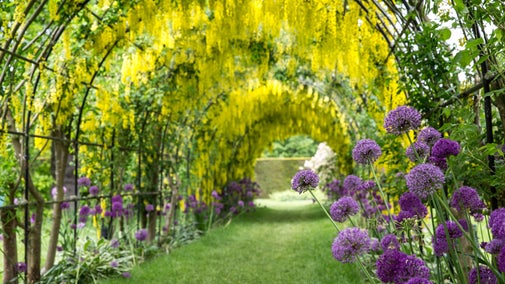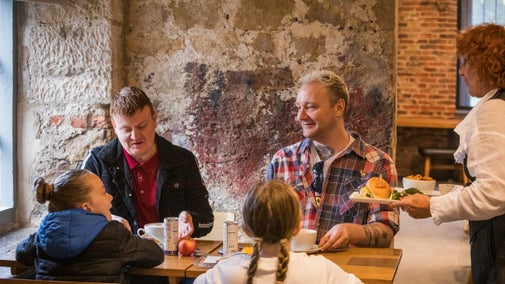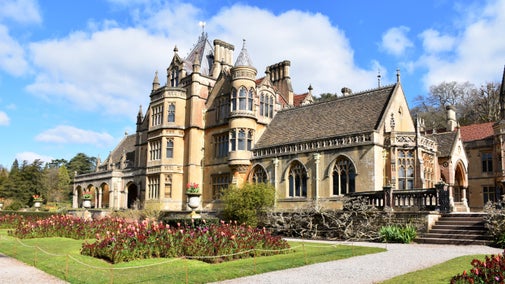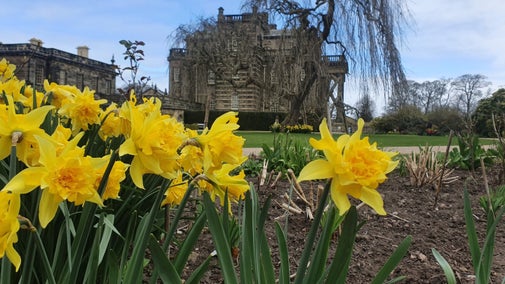
Seaton Delaval's collections
Explore the objects and works of art we care for at Seaton Delaval Hall on the National Trust Collections website.

Seaton Delaval Hall may have been one of architect Sir John Vanbrugh's smallest country houses, but it was home to the larger-than-life Delaval family. The house and surrounding landscape were in keeping with the style expected in Georgian society, yet behind the formality lies a story of theatricality, creativity and mischief.
Uncover the stories of the theatrical and mischievous 'gay Delavals' as you explore Vanbrugh's dramatic Northumbrian country house.
Inspired by the Delavals - keen theatregoers, performers and patrons of the arts - the stories of the Hall and its collection are presented using the structure of a play with the 'stage set' of a building as the backdrop.
Built in the early 18th century, Seaton Delaval Hall is one of the best surviving examples of English Baroque architecture, characterised by symmetrical wings and elaborate decoration. The Central Hall is regarded by many as the finest work of Vanbrugh, who also designed Castle Howard and Blenheim Palace. His career as a playwright is evident ithroughout his architecture, such as in the raked stage of the South Portico.

The main entertaining space for the Hall, the Saloon was where the Delaval family held their celebrated parties. Evidence of its once ornate decoration still remains - look out for the face hidden in the remains of the plasterwork.
Inside, your first clues into the family's theatrical past are found in Prelude, the hand-painted sun, moon and clouds which introduce theatrical motifs inside the Hall and are inspired by a record found in the archives of theatrical scenery belonging to the family.
Move into the Central Hall. Although the damage from the 1822 fire is clear in the scorched pink stone and the marks left from molten lead window frames, the interior of the Hall retains much of Vanbrugh's original design, such as the muses statues and fireplaces. It was designed to impress visitors with its double storey height, grand balcony and black limestone and white marble checked floor. Look up to the 'Big Opening Number' See and Be Seen, where the theatrical mirrored sphere encourages you to explore the architecture and look up, putting you firmly in the centre of Vanbrugh's stage.
Seaton Delaval Hall's iconic pair of cantilever stairs are a feat of 18th-century engineering. Each individual step is fitted to the next without the need for additional central support.
The ironwork handrails melted by the fire are left at the upper levels while the lower part was reconstructed as part of the 22nd Lord Hastings' restoration work in the 1960s.
Stand at the bottom and look up at the stunning view - you get your best social media shot here!
Please take care when travelling up and down these historic stairs. At over 300 years old they are worn and uneven in places; please mind your footing.

Head down the cantilever stairs and into the Basement for Act I. Explore the foundation stones of the Delavals' wealth - coal, glass, shipping - and discover the spaces where the house staff anchored the Hall and successfully kept it running.
The rooms in this space were built to be just as grand as those above. Take in the vaulted ceilings and don't miss the Steward's Room with '1753' etched into the doorway of the silver store, thought to have been done by Sir Francis Blake Delaval on inheriting the Hall.

Head along the recently reopened red carpet of the Kitchen Passage to the West Wing for Act II. Here you'll meet the main characters - the 'gay Delavals' - through the collection of family portraits and discover some of the stories for which they were known.
Take to the stage on our Baroque-inspired travelling theatre in the Kitchen and make your own performance, just as the Delavals would have done.
Don't miss the upside-down room, inspired by one of the most well known anecdotes, and listen carefully for roaming fowl... guests were said to find geese in their beds!
Visit the Drawing Room where you can play the Game of Seaton Delaval Hall and meet more of the people who have lived, worked and influenced the Hall at various times in its 300-year history.
Head downstairs and into the Collections Store. These three rooms offer you the opportunity to explore our collection more closely. Have a look underneath and behind! Enjoy the film telling the story of our collection of embroidered chairs created by animation students from Northumbria University as part of the National Lottery Heritage Fund supported Curtain Rises project. For conservation reasons we can't have them all on display at the same time - this film makes sure you don't miss their full story!

Look around the grand stables to take a step back in time. Here you can see where the horses belonging to guests would have been kept. Imagine Seaton Delaval Hall in centuries past – a bustling place with all manner of visitors coming and going.


Explore the objects and works of art we care for at Seaton Delaval Hall on the National Trust Collections website.

Learn the story of this baroque Northumberland manor house and the individuals who shaped it, including architect Sir John Vanbrugh and the notorious 18th-century Delaval family.

Find out what you’ll discover in the varied garden at Seaton Delaval Hall, from a Parterre and Rose Garden to a centuries-old weeping ash and woodland waiting to be explored. Enjoy a variety of spring blooms from snowdrops and daffodils to the famous laburnum arch plus, rhododendrons and azaleas.

There's lots to enjoy as a family at Seaton Delaval Hall. Whether you're uncovering the stories of the flamboyant Delavals through the collection and creative installations or you're enjoying the take on their love of trickery and theatricality in the gardens or enjoying the Delaval Playdium, there's something for all families to enjoy and discover here. Enjoy spring family fun here in Northumberland in March and April and plan your Easter holiday visit. Take part in our 10-point trail during the Easter holidays and hunt for eggs, take part in team races, plant sunflower seeds and more!

During your visit to Seaton Delaval Hall, stop by the Brewhouse Café. Housed in a 17th-century building, it offers a wide range of drinks and snacks, as well as indoor and outdoor seating.

Historic buildings are a treasure trove of stories, art and collections. Learn more about their past and plan your next visit.

From medieval manor houses to classic Georgian mansions to lighthouses, the North East's story is brought to life through its characterful historic buildings.